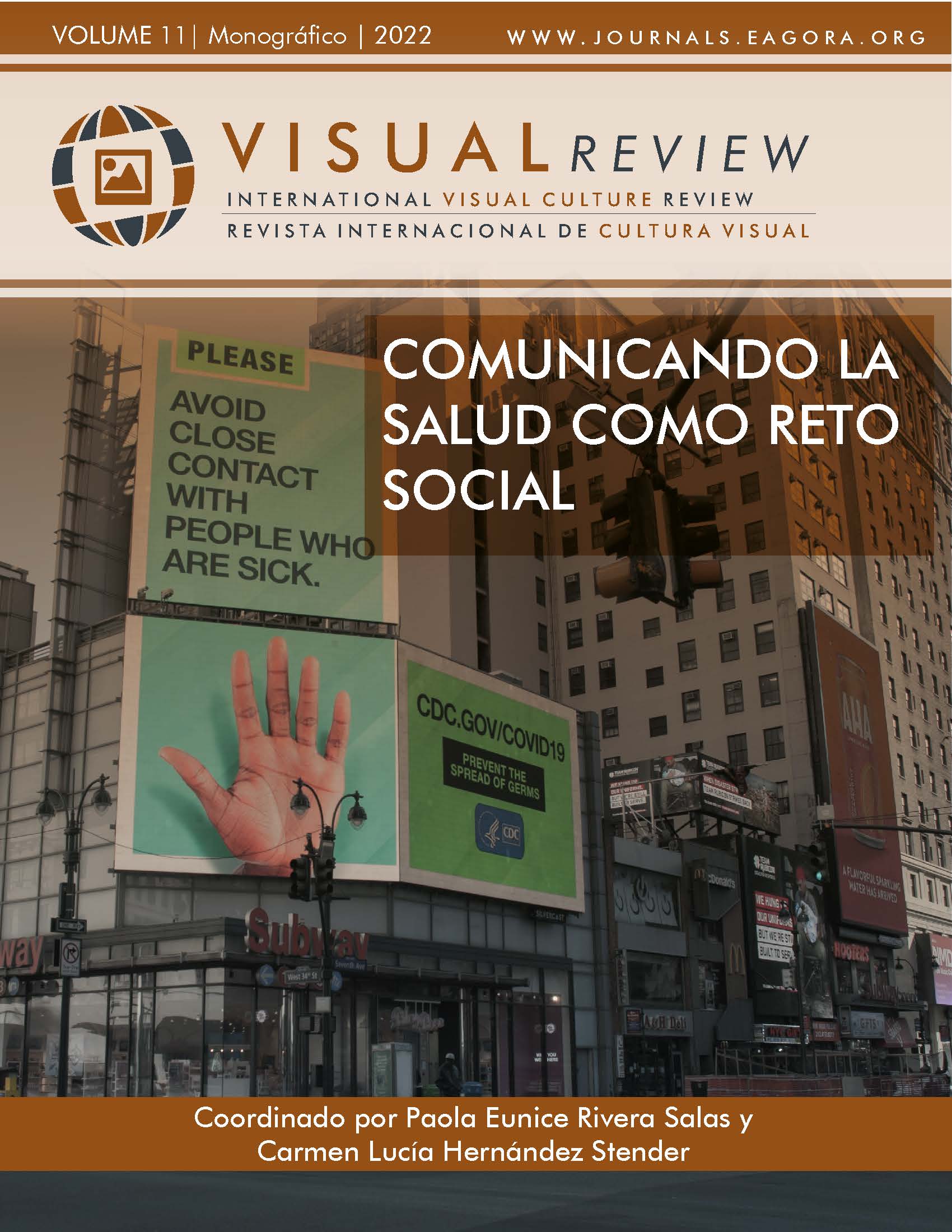The emerging social scientific communication of COVID-19
Semantic bibliometric analysis in SCOPUS
DOI:
https://doi.org/10.37467/revvisual.v9.3633Keywords:
Science system, Communication, Semantics, Bibliometric, COVID-19, SCOPUS, PandemicAbstract
The article aims to elucidate how the social scientific communication of COVID-19 is expressed in symbolically generalized media of Scopus. A mixed approach was used to study 301 publications through a structural and semantic dimension. The results show Spanish institutions as the most productive, where five categories emerge semantically: 1. COVID as a pandemic, sanitary and confinement expression; 2. Education and teaching-learning processes; 3. Virtuality, technology and digitalization; 4. Communication, media and information responsibility and; 5. Rights. Axes which are always expressed from the sociocultural concern in a pandemic and epidemiological context.
Downloads
Global Statistics ℹ️
|
585
Views
|
309
Downloads
|
|
894
Total
|
|
References
Barnes, B., Kuhn, T., & Merton, R. (1980). Estudios sobre sociología de la ciencia. Alianza.
Beck, U. (2006). La sociedad del riesgo. Hacia una nueva modernidad. Paidos.
Blanco, J. (2009). Teoría de sistemas e historia de las ideas. Aportes sistémicos al debate de la historia de las ideas. Persona y sociedad, XXIII(2), 91-113. https://doi.org/10.53689/pys.v23i2.180 DOI: https://doi.org/10.53689/pys.v23i2.180
Brunet, I., & Valero, L. (1996). Epistemología I. Sociología de la ciencia . PPU.
Bunge, M. (1998). Sociología de la ciencia. Siglo XX.
Bunge, M. (2002). Las ciencias sociales en discusión: Una perspectiva filosófica. Sudamericana.
Carrillo Velázquez, L. (2016). Innovación y tecnología en la sociedad de las organizaciones. Su complejidad desde una perspectiva interdisciplinaria. En L. Carrillo Velázquez (Coord.), Gestión del conocimiento y tecnología en la investigación-docencia interdisciplinaria. El estudio de organizaciones civiles no lucrativas en Latinoamérica. (pp. 20-44). CEIICH-UNAM. DOI: https://doi.org/10.22201/ceiich.9786070278730e.2016
Corsi, G., Esposito, E., & Baraldi, C. (1996). Glosario sobre la teoría social de Niklas Luhmann. Universidad Iberoamericana.
Datosmarco.com. (2022, Julio 13). España - COVID-19 - Crisis del coronavirus. https://datosmacro.expansion.com/otros/coronavirus/espana
Díaz Herrera, C. (2020). Propuesta metodológica para un análisis semántico de un medio de comunicación simbólicamente generalizado. Revista General de Información y Documentación, 30(2), 423-444. https://doi.org/10.5209/rgid.72813 DOI: https://doi.org/10.5209/rgid.72813
Díaz Herrera, C. (2022). Análisis bibliométrico y semántico de Cinta de Moebio: dos décadas de epistemología en ciencias sociales. Bibliotecas. Anales de Investigación, 18(1), 1-18. http://revistas.bnjm.cu/index.php/BAI/article/view/377
Echeverría, R. (2015). El Búho de Minerva. JC Sáez.
Floriani, D. (2015). Las Ciencias Sociales en América Latina: lo permanente y transitorio, preguntas y desafíos de ayer y hoy. Polis, 14(41), 127-146. http://dx.doi.org/10.4067/S0718-65682015000200009 DOI: https://doi.org/10.4067/S0718-65682015000200009
Ganga Contreras, F., Viancos, P., Díaz-Barrios, J., Alarcón, N., & Saez, W. (2021). Producción científica sobre coronavirus y SARS-CoV-2 publicada en revistas indexadas en la base de datos Scopus. Bibliotecas. Anales de Investigacion, 17(2), 159-180. http://revistas.bnjm.cu/index.php/BAI/article/view/411/393
Garretón, M. A. (2014). Las ciencias sociales en la trama de Chile y América Latina. Estudio sobre transformaciones sociopolíticas y movimiento social. LOM.
Guba, E., & Lincoln, Y. (2002). Paradigmas en competencia en la investigación cualitativa. En C. Denman, & J. Haro, Por los rincones. Antología de métodos cualitativos en la investigación social (pp. 113-145). Editorial El Colegio de Sonora.
Guzmán-Useche, E., & Rodríguez-Contreras, F. (2020). Scientific Publication and Dissemination in Times of a COVID-19 Pandemic. Revista Electrónica Educare, 24(Suplemento), 1-4. http://dx.doi.org/10.15359/ree.24-S.6 DOI: https://doi.org/10.15359/ree.24-S.6
Hernández-Sampieri, R., & Mendoza, C. (2018). Metodología de la investigación. Las rutas cuantitativa, cualitativa y mixta. Mc Graw Hill.
López, C. (2018). Comunicación y sentimientos desde la Teoría de Sistemas Sociales de Niklas Luhmann. Sociológica (México), 33(93), 53-86. https://tinyurl.com/46nwh9pp
López-López, W., Vega-Arce, M., Salas, G., Urzúa, A., Torres-Fernández, I., & Ho, Y.-S. (2021). Bibliometric analysis of COVID-19 editorial materials in the beginning stage of the pandemic. Malaysian Journal of Library & Information Science, 26(1), 103-116. http://dx.doi.org/10.22452/mjlis.vol26no1.6 DOI: https://doi.org/10.22452/mjlis.vol26no1.6
Luhmann, N. (1996). La ciencia de la sociedad. Universidad Iberoamericana, Anthropos, ITSEO.
Luhmann, N. (2006). La sociedad de la sociedad. Herder.
Manzanos, C. (2002). Las ciencias sociales: convergencias disciplinarias y conocimiento de fronteras. El caso de la sociología. Revista mexicana de ciencias políticas y sociales, 45(186), 13-65. http://dx.doi.org/10.22201/fcpys.2448492xe.2002.186.48121 DOI: https://doi.org/10.22201/fcpys.2448492xe.2002.186.48121
Mardones, R. (2016). Discurso del territorio enunciado por las ciencias sociales en las publicaciones científicas de revistas latinoamericanas. Prisma Social(16), 556-596. https://revistaprismasocial.es/article/view/1266
Melogno, P. (2012). La cientificidad de las ciencias de la información: fundamentación filosófica o resolución de problemas. Investigación bibliotecológica, 26(56), 13-29. http://www.scielo.org.mx/scielo.php?script=sci_arttext&pid=S0187-358X2012000100002&lng=es&tlng=es DOI: https://doi.org/10.22201/iibi.0187358xp.2012.56.33205
Ortiz-Núñez, R. (2020). Análisis métrico de la producción científica sobre COVID-19 en SCOPUS. Revista Cubana de Información en Ciencias de la Salud, 31(3), 1-20. http://www.acimed.sld.cu/index.php/acimed/article/view/1587 DOI: https://doi.org/10.53732/rccsalud/03.01.2021.01
Pignuoli-Ocampo, S. (2013). El Modelo Sintético de Comunicación de Niklas Luhmann. Cinta de Moebio(47), 59-73.http://dx.doi.org/10.4067/S0717-554X2013000200001 DOI: https://doi.org/10.4067/S0717-554X2013000200001
Ritzer, G. (2001). Teoría sociológica clásica. Mc Graw Hill.
Ritzer, G. (2002). Teoría sociológica moderna. Mc Graw Hill.
Torres, C., & Torrell-Vallespín, S. (2020). Análisis bibliométrico de la producción científica latinoamericana y del Caribe sobre COVID-19 en PUBMED. Revista Cubana de Información en Ciencias de la Salud (ACIMED), 31(3), 1-21. http://scielo.sld.cu/pdf/ics/v31n3/2307-2113-ics-31-03-e1600.pdf
Downloads
Published
How to Cite
Issue
Section
License
Those authors who publish in this journal accept the following terms:
-
Authors retain copyright.
-
Authors transfer to the journal the right of first publication. The journal also owns the publishing rights.
-
All published contents are governed by an Attribution-NoDerivatives 4.0 International License.
Access the informative version and legal text of the license. By virtue of this, third parties are allowed to use what is published as long as they mention the authorship of the work and the first publication in this journal. If you transform the material, you may not distribute the modified work. -
Authors may make other independent and additional contractual arrangements for non-exclusive distribution of the version of the article published in this journal (e.g., inclusion in an institutional repository or publication in a book) as long as they clearly indicate that the work was first published in this journal.
- Authors are allowed and recommended to publish their work on the Internet (for example on institutional and personal websites), following the publication of, and referencing the journal, as this could lead to constructive exchanges and a more extensive and quick circulation of published works (see The Effect of Open Access).














